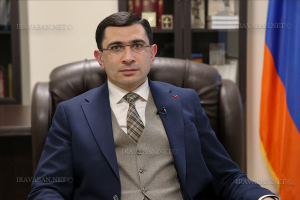Ms Liza Grigoryan, Judge of the Yerevan Court of General Jurisdiction has been in the judicial system since 1993. Initially, she was appointed as a clerk, then secretary of sessions, and on 4 April, 2013, she was appointed as judge of Court of General Jurisdiction of Erebuni and Nubarashen administrative districts of Yerevan. She has worked for a long time as advocate and lawyer.
Within the framework of the series “Armenian Judges”, we spoke with the judge of the Yerevan Court of General Jurisdiction, Liza Grigoryan, about the lawsuit filed against the Supreme Judicial Council, the independence of the judiciary and the issues of concern of judges.
– You have filed a lawsuit against the Supreme Judicial Council. Can you present the cause?
– The claim referred to the list of candidates running for the vacant positions at the Court of Appeal and Cassation Court. Last year, a contest was held to fill vacant places for the Civil Court of Appeals and to fill a vacant position of a judge at the Cassation Court, and I applied to both opportunities. In the case of a cassation case, I was not selected for both positions. In this regard, the Judicial Code has serious shortcomings and my purpose was to raise these shortcomings, to formulate the practice and to have legislation which will make the process of advancement for judges more predictable.
– We had such a case when judges Alexei Sukoyan and Karine Petrosyan applied to the court with the demand to invalidate the decision of the Supreme Judicial Council on nominating candidates for bankruptcy court judges. During the interview with Iravaban.net, they stated that after the submission of the application, indirect pressure was applied to them. Have you experienced such pressure on you?
-I still have not felt such pressure on me. Of course, I cannot say anything bad about the internal approach, attitude, or personal worry, because I do not have such contacts with members of the Supreme Judicial Council. I am very happy that this has not been reflected upon my work.
– The above-mentioned judges stated that the decision of the SJC was not reasoned and that is why they applied to court. Do you intend to get an explanation as well?
–Yes, the decisions related to myself as well as all the other decisions of SJC are not reasoned. Of course, the SJC also raises legislative issues, in particular, that the Judicial Code provides for a closed and secret ballot, in which case they do not see how these decisions can be justified. There is a legislative problem, but I do not think that solutions for this cannot be found without changing the code. That is to say, the reasoning of the decisions is very important, because they are dealing with the judicial system and our SJC has a wide range of powers and in this respect I think it is necessary to justify them. It should be at least informed to the judge verbally why the preference was given to another candidate rather than to him? It is necessary to tell the candidate that he/she has certain shortcomings so that the latter improve them during his/her further activity. Or if there are no shortcomings, let them say that this candidate has these certain advantages, and that was why we considered that he meets the standard better. This is not merely my subjective perception, it is an internationally accepted experience, and the Venice Commission has also pointed out that. The Commission notes that they should be subject to appeal as well.
– However, our legislation does not stipulate the procedure for appealing the SJC’s decisions, in addition at the end of the decision it is stated that the decision is final, which means, it is not subject to appeal.
– Yes, our legislation does not provide for the institution of appeal, and that gap, de facto, is supplemented in the scope of administrative proceedings. In other words, the decisions of the Supreme Judicial Council, as an administration, fall under the jurisdiction of the administrative court. In this case, there is a need to initiate a legislative change. If we find that the administrative court is not adapted to reviewing the decisions of the SJC, we must have another body. The Administrative Court now revisits these decisions as it is administration and is in its jurisdiction and we do not have a different instance for appealing so that the judge will exercise his/her right.
– In one of your interviews in 2014, you mentioned that “you have not yet become disgusted with the judicial system”. You can claim the same after 5 years.
– No, honestly, I cannot say the same thing, and it is mainly related to overload. The judge is overloaded today. Workload, material-technical support; we are constantly facing technical issues. Our job is very hard, and we face really very difficult issues, and also the poor material-technical support is added to it. My conditions are very good, there are judges who work really bad conditions, and such things should not be allowed. At least the minimum conditions must be met for the judge.
In addition, under such workload (cases), the judge cannot focus on his professional growth, to study new decisions, to study international experience and constantly carries out technical work. This, of course, affects the enthusiasm. I hope that in some way these issues will be solved.
– So what do courts need?
– The conditions of the courts conditions of room, outdated technique, small number of employees as compared to the number cases. You may compare how many people applied to be a judge some 4-5 years ago and how many people apply now; this sharp decline shows that the work of judges has become unattractive. Also, the negative attitude of the society contributes to the fall of trust towards the courts and the judiciary.
– You talked about the workload. How many cases are there in your proceedings just now?
– There are currently 600-700 cases in my proceedings. Frankly speaking in recent years, I have had a more cases, however today the cases have become more complicated.
After the adoption of the new Civil Procedure Code, some issues have been simplified, but in any case, the writing, technical work is too much, which, in some cases, extend the case investigation and requires additional work.
– Have you ever experienced increased trust in courts after the May events?
– I cannot say for sure, but I have felt that people are becoming more demanding towards the court. They require their case to be investigated faster, information provided faster, and so on. I appreciate this.
– Are the courts more independent now?
– This is a very sensitive issue for the judge. The judge does not have the right to criticize other judge or judicial authority. I can say that there are serious problems in the judicial system, like in other systems. Independence of the courts and the normal functioning of the judicial system are the activities directed to the most important principles of the state. Rule of law is mainly ensured by the judicial system. We have a legislative, executive, and judicial system, but as we know, the legislature and the executive are almost the same power, and here only the judicial power remains, which ensures the separation of these powers. If judicial power is not independent, it will mean that there is no democracy, there is no rule of law. And this is a problem No1for the state.
Great efforts and much investment are necessary to ensure independence. Even the remuneration of judges is one of the most important factors affecting the independence of judges. If the judge is not properly paid, we have a problem in terms of independence.
If we say that we are independent from May or not, it cannot change immediately from May. No action has been taken since May to secure conditions guaranteeing the independence of judges.
– If the head of the government says that there will be no “phone calls for justice”, is it a step to ensure the independence of the judiciary or not?
It’s a good move, but I do not think it is a sufficient step for the independence of the court. I do not think that just announcing that there will be no more calls, is sufficient that the judge will be independent. Any statement by an official on any case may affect the judge.
If an official states that this court has to do so, make such a decision it will be sufficient for the judge to feel constrained. I still do not say that the official has no right to make such a statement.
That statement is a very small expression of will. It is not only sufficient, but also not essential to itself. Suppose he does not call on the phone, but on social networks, he explicitly states that this is right, that the judge should make such a decision, tell me, what is the difference, by phone or on the social network? There is no difference.
– On 14 February, the SJC published the decision on subjecting Arayik Melkumyan, the judge of the Yerevan Court of First Instance, to disciplinary liability, according to which the judge’s powers were terminated. He claimed that he had allowed an error, which was due to the overload and the lack of staff.
– Let me tell you that I also had errors, and there were also serious errors, but in my opinion, an objective lawyer and a person who is not lawyer can understand; is it really an error or a certain intention? Indeed, the judges are very busy, there is so much technical work and it is so easy to miss and make mistakes, but in any case it has to have its own borders. I am not familiar with disciplinary decision against Mr. Melkumyan, but in any case I would say that the international standard states that in exceptional cases the judge’s powers must be terminated.
– It is often talked about the political pressure on judges, but there is nothing said about the impact of public opinion, and many people say that cases of changing the measure of restraint that have taken place recently were influenced by public opinion..
-The public opinion, of course, is affecting, and it is unacceptable. The judge must be independent not only from the legislator, the executive, but also from public opinion. It is unacceptable that the society should determine who should be detained and who not. Certain actions should be taken against this phenomenon. We will come to a worse situation than the judicial system had ever had before.
The European Court of Human Rights has strongly condemned Armenia related to the issue of detention. The European Court has noted that the appeal of detention in Armenia is ineffective. It is the worst estimate for the state. If we want the score to be worse, yes, let’s listen to the public opinion and make a decision, but it will lead to anarchy.
I understand that we have a problem of raising public confidence in the judiciary. This phenomenon is extremely dangerous, and first of all, the state should be interested in such cases not being repeated.
– We have studied your declarations on property and income. In 2014, you had declared a car and an apartment worth $ 51,000. After you submitted the declaration several media outlets published this not in positive light. Further the car and the apartment were not indicated in the later declarations. It was mentioned that the apartment was sold.
– There was definitely no media influence here. I had sold my car and bought the car that had problems with the transmission. It was ordered it from the US, I did not drive that car for even a day and returned it to sell it and return my money.
The apartment was bought on mortgage, but then I sold it, because later there was a more affordable option for public servants. I sold it to buy another apartment and have already bought it.
– There was also indication of $ 80 thousand and 23 thousand Euros.
-I had saved that money to buy an apartment. It is the money earned and saved through my advocacy activity.
Details in the video
Interview by Yevgenya Hambardzumyan
Photos by Yura Zohrabyan











